INSIDE ISSUE 18.37 | SEPT. 13, 2019
 BIG STORY: Lack of GOP presidential primary shocks some lawmakers
BIG STORY: Lack of GOP presidential primary shocks some lawmakers
NEWS BRIEFS: Recyclers rack up millions in state-funded cleanup, more S.C. news
COMMENTARY, Brack: Bluffton legislator flies in much-needed aid to Bahamas
SPOTLIGHT: Municipal Association of South Carolina
FEEDBACK: Legislature works against conservation, mitigation, reader says
MYSTERY PHOTO: Old house with brown shutters
S.C. ENCYCLOPEDIA: The Battle of Ninety Six
BIG STORY: Lack of GOP presidential primary shocks some lawmakers
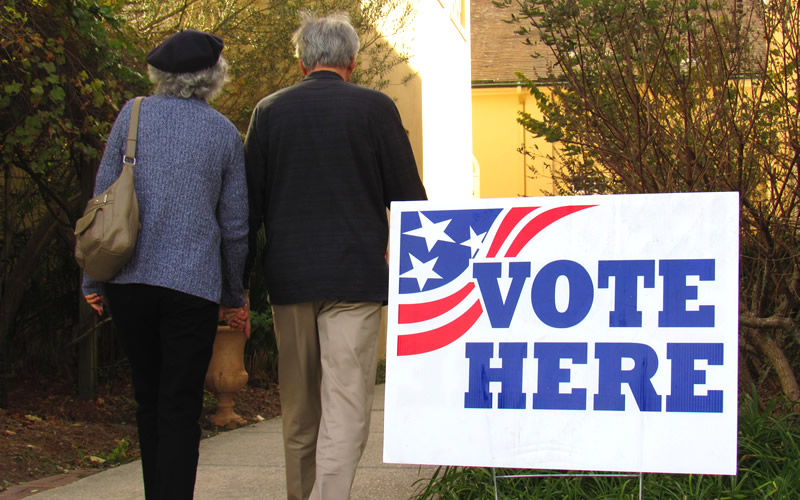
By Lindsay Street, Statehouse correspondent | South Carolina lawmakers say the recent decision to hold no 2020 Republican presidential preference primary was never in their hands, but some say they are still shocked that the party decided to forgo a challenge to President Donald Trump.
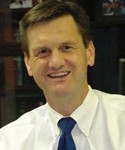
“To be honest, that announcement took me by surprise,” said Beaufort Republican Sen. Tom Davis, a former gubernatorial chief of staff to new GOP presidential challenger and former S.C. Gov. Mark Sanford.
The move to bypass a February 2020 primary leaves Trump unchallenged by his party on the ballot in the Palmetto State, despite three announced contestants, including the state’s own Comeback Kid. In 2013 after having served three terms in Congress and two terms as governor (and an affair), Sanford wore down his shoes in a 2013 special election to fill now-U.S. Sen. Tim Scott’s seat and return to Congress. He lost his reelection bid in 2018 in a primary by Trump-supported candidate Katie Arrington who ultimately lost to businessman Joe Cunningham, a Democrat, in the general election.
Parties trump voters
 While eight of the 11 lawmakers who spoke on the record for this story supported a 2020 Republican presidential primary, they said they intended to keep presidential preference primaries in the hands of the parties.
While eight of the 11 lawmakers who spoke on the record for this story supported a 2020 Republican presidential primary, they said they intended to keep presidential preference primaries in the hands of the parties.
“It’s not our providence to telling (the parties) how to do things,” House Minority Leader Todd Rutherford, a Democrat from Columbia.
Many Republicans agreed.
“That decision is still best left up to the individual parties,” Goose Creek Republican Sen. Larry Grooms said. “I wouldn’t want to force the Democrats to have a primary if they didn’t want to, and I wouldn’t want the Democrats to force Republicans to have a primary if they didn’t want to. “
Sanford: ‘The timing is interesting’
Sanford officially announced on Sunday that he will mount a longshot bid against Trump. He has said he is serious, and he wants to bring fiscal responsibility back into the Republican discourse.
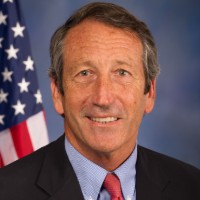
“This just so happens to happen in the state you happen to be from,” Sanford said Wednesday to Statehouse Report. He said he has the ability to mount “a credible campaign” in South Carolina. “The timing is interesting … Let’s be honest: it’s not being done to save money.”
The same weekend Sanford announced his candidacy, the party announced there would be no presidential primary. South Carolina is one of four states so far where Republicans have said they will not hold a vote. S.C. GOP Chairman Drew McKissick released a statement saying the move would save taxpayers $1.2 million, and there was “no legitimate primary challenger.”
Go tell that to the former governor, who said he will likely challenge the decision, citing a state party rule that says the state convention must decide whether to hold a primary, not the executive committee. Nevertheless, the S.C. GOP has not held a primary against an incumbent Republican president in nearly 30 years, as reported by The State newspaper. During the 1992 Republican presidential preference primary, conservative commentator Pat Buchanan and former Ku Klux Klan leader David Duke were on the GOP ballot alongside President George H.W. Bush, who won the S.C. and the national nomination, but lost in the general election to Arkansas Democratic politician Bill Clinton.
According to state elections’ database that goes back to 2008, the Democrats have not challenged a sitting Democratic president either. Barack Obama is listed as “uncontested” in 2012.
But Trump is facing three in-party challengers: Sanford, former Massachusetts Gov. Bill Weld, and former Illinois Congressman Joe Walsh.
Lawmakers and the primary
With a home-state challenger, some are left with a feeling of unfinished business, even with the Palmetto State’s strong support for Trump.
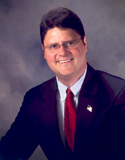
“I would rather see one happen but I understand the party’s decision in this matter because of Mr. Trump’s extremely high approval rating within the Republican Party in South Carolina,” House Majority Leader Gary Simrill of Rock Hill told Statehouse Report. He said Trump’s likely victory in South Carolina is a “forgone conclusion.”
Those are the same two words Townville Rep. Jonathon Hill used to describe a would-be Trump primary victory.
“I can’t say I’m surprised (at there being no primary),” Hill said. “I do think that competition is generally good, helps us to have better candidates in the end and so I would have liked to have seen a debate in South Carolina, particularly in regards to the administration and the challenger’s approaches to deficit. I’m disappointed that didn’t happen.”
Lawmakers have only ever messed with the presidential preference primary once in recent memory. In 2007, the legislature passed Act 81, which gave the state Election Commission and county election offices responsibility over conducting the primaries. Dates are determined by the parties under the current law, according to commission spokesman Chris Whitmire.
While no lawmaker said they wanted to intervene, a majority — including those supportive of the president — said they would like to see a Republican primary in 2020.
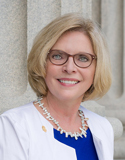
GOP Sen. Katrina Shealy of Lexington said that while the decision is out of her hands, she didn’t think it was a “good idea” to not have the primary.
“It sets the precedent you don’t give people the choice to vote for somebody else if they want to,” she said. “Being somebody who has fought to get on the ballot, I always think people should be given the choice.”
Shealy was one of hundreds of non-incumbent candidates to be purged from primary ballots in 2012. She eventually made it back on the ballot as a petition candidate in the general election, ousting the incumbent Republican. In her 2008 bid for the state Senate seat, she was endorsed by then-Gov. Mark Sanford.
“He’s very conservative, very fiscal conservative,” she said. “But he probably could win other states before he could win South Carolina.”

Grooms, who lost in the 2013 Republican primary to Sanford for the open congressional seat, said the party’s decision is not about Sanford, but rather how strong Trump is.
“(But) I would be supportive of a presidential preference primary. There’s a number of folks in the state that would want to vote in a Republican primary,” he said.
Pickens Repubican Rep. David Hiott said he didn’t have a “personal opinion” about the move, and former Charleston County GOP Chair and current S.C. Rep. Lin Bennett, R-Charleston, said deciding not to hold a presidential primary isn’t the Republican party’s “first rodeo.”
“I’m not quite sure what the concern is that it will hurt us. What it will do is save the taxpayer a whole lot of money,” she said.
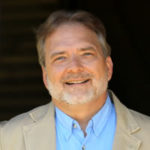
Predictably, Democratic lawmakers see the lack of Republican presidential primary as a misstep.
“I fully support Democracy and the ability of people to have choices … They’re just trying to shut down any possible opposition,” said Sen. Brad Hutto of Orangeburg.
Added Rutherford: “It is totally not surprising that the party of Trump takes away the opportunity for people to take away their right to vote, but it is somewhat surprising they took it away from people who may want to vote for him.
- Have a comment? Send to: feedback@statehousereport.com
NEWS BRIEFS
Recyclers rack up millions in state-funded cleanup, more S.C. news
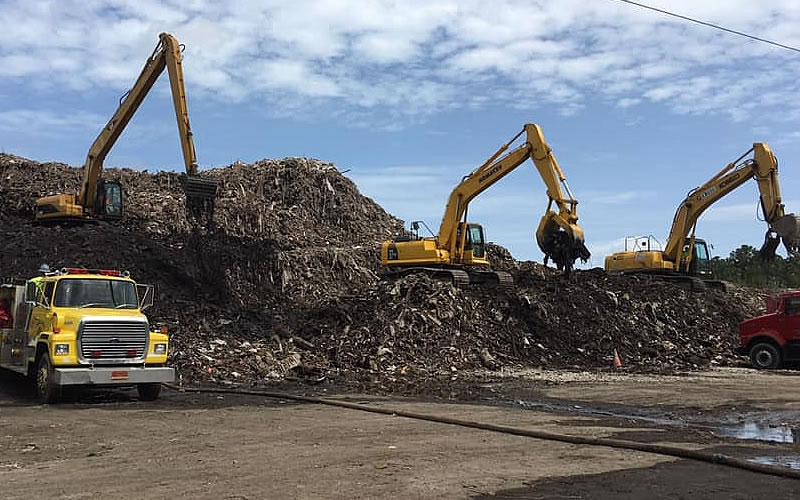
By Lindsay Street, Statehouse correspondent | At least three state lawmakers say the state needs to crackdown on problematic private recyclers after two have cost taxpayers $7.8 million in the last year.
S.C. Rep. Sylleste Davis of Moncks Corner, and S.C. Sens. Tom Davis of Beaufort and Larry Grooms of Goose Creek, all Republicans, have questioned whether the state’s environmental agency is doing enough to stop recyclers before they become a problem that needs millions of public money. They are also looking at potential further regulation.
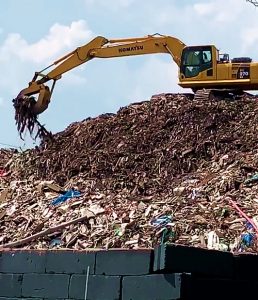 “We have things in place that fell through the cracks. There needs to be stronger enforcement. There needs to be additional checks on these recycling facilities,” Grooms said this week.
“We have things in place that fell through the cracks. There needs to be stronger enforcement. There needs to be additional checks on these recycling facilities,” Grooms said this week.
Viva Recycling near Moncks Corner cost $3.3 million and was cleaned up earlier this year. Able Recycling in Okatie is projected to cost $4.5 million and cleanup is slated over the coming months. The two are separate types of recyclers and are treated differently under S.C. law.
- Read a full DHEC summary of the Viva cleanup efforts here.
- Read a full summary of Able Contracting’s dealings with DHEC here.
After a Statehouse Report request on whether there are other private sites that have received taxpayer money to cleanup, the S.C. Department of Health and Environmental Control (DHEC) did not offer a list prior to deadline. The agency released this statement on how it has responded to staving off costly problems:
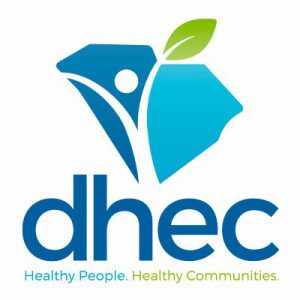 “When a responsible party is unable or unwilling to remediate imminent and substantial threat to public health or the environment, DHEC may take responsive actions to mitigate the threat through the use of public funds. DHEC pursues legal action to hold responsible parties accountable, including cost recovery. DHEC regularly reviews its regulations and statutes to identify options for improving the agency’s authority to protect public health and the environment.”
“When a responsible party is unable or unwilling to remediate imminent and substantial threat to public health or the environment, DHEC may take responsive actions to mitigate the threat through the use of public funds. DHEC pursues legal action to hold responsible parties accountable, including cost recovery. DHEC regularly reviews its regulations and statutes to identify options for improving the agency’s authority to protect public health and the environment.”
The agency is seeking to recover $1.6 million from the Viva site. The money used to clean the site was funded through the state’s $2 tire fee.
Sen. Davis said a 2018 update to the state’s Hazardous Waste Management Act should help with sites like Able Contracting. Now, he wants DHEC to do its job.
Grooms agreed: DHEC is “not doing the job they’re supposed to do.”
Rep. Davis said she is trying to make changes to the state’s tire recycling program a priority in 2020 for House leadership. She filed H. 4504 April 30. The bill is in the Agriculture, Natural Resources and Environmental Affairs committee.
“It gives DHEC more ability to stop something like (Viva) before it gets out of hand,” Davis said. “We have a larger problem but the problem I was trying to address is waste tires.”
![]()
In other S.C. news:
Education funding to be discussed Sept. 16. The state’s Board of Economic Advisors will meet 1:30 p.m. Sept. 16 in room 417 of the Rembert Dennis building at the Statehouse in Columbia. The meeting will include an update on the education funding model in the state, which is being studied by the Revenue and Fiscal Affairs Office at the direction of the state legislature. See the agenda here.
Two Democrats propose paying college athletes. S.C. Sen. Marlon Kimpson, D-Charleston, and Rep. Justin Bamberg, D-Bamberg, said they want to follow California’s lead on becoming the second state in the nation to allow college athletes to profit from their fame by earning endorsement money. Read more.
Cunningham, Duncan differ on energy plans. S.C. congressmen on opposite sides of the aisle have proposed competing energy plans over offshore drilling in the U.S. House. U.S. Rep. Joe Cunningham, a Democrat of the Lowcountry, proposed a bill that would ban drilling offshore in the Atlantic and Pacific oceans. The bill passed on a 238-189 vote; it now heads to the U.S. Senate where it is not expected to get enough votes to pass into law. U.S. Rep. Jeff Duncan, a Republican of the Upstate, has also proposed a bill Sept. 11 that will allow states to decide whether to allow offshore drilling. No vote has been made on Duncan’s bill.
Lydon nominated for U.S. District judgeship. U.S. Attorney Sherri Lydon of South Carolina has been nominated by President Donald Trump for a seat on the U.S. District Court for the District of South Carolina. She has served as U.S. Attorney in the state since 2018 after she was nominated by Trump and confirmed by the U.S. Senate.
S.C. households to get $50 refund soon. The legislature-approved one-time $50 rebate per income tax return will be mailed out Dec. 2. Read more.
Climate ‘strike’ set in S.C. cities. At least two Climate Strike events are slated in South Carolina Sept. 20 to coincide with a worldwide event promoting climate change policies. Columbia will hold a strike at 9:30 a.m. Sept. 20 at 1100 Gervais St. and Greenville will hold a strike at noon Sept. 20 at Greenville City Hall. The strike coincides with strikes in other cities, three days before the United Nations’ Climate Summit in New York City. More info.
2020 candidate calendar
Throughout the campaign season, we are working to keep South Carolina informed of candidate events in the state. Have an event you want us to know about? Email us at 2020news@statehousereport.com.
Galivants Ferry Stump on Monday. At least six Democratic presidential candidates will speak Sept. 16 at a special presidential edition of the Galivants Ferry Stump meeting. Among those who have confirmed they will attend are former Vice President Joe Biden, New York City Mayor Bill de Blasio, South Bend Mayor Pete Buttigieg, U.S. Rep. Tulsi Gabbard of Hawaii, U.S. Sen. Amy Klobuchar of Minnesota and U.S. Sen. Bernie Sanders of Vermont. The event starts at 5 p.m. and will be moderated by U.S. Rep. Jim Clyburn, D-S.C.
Castro celebrates Hispanic heritage Sept. 15. Former U.S. Department of Housing and Urban Development Secretary and Democratic presidential hopeful Julián Castro will be in South Carolina Sept. 15 for the following events: 11:45 a.m. for Hispanic Heritage Month kickoff at International Dance Academy in Greenville; 3:40 p.m. at a University of South Carolina Presidential Town Hall at Russell House Student Union in Columbia; and 4:45 p.m. for Mexican Independence Day Celebration at Cabanas Restaurant in Columbia.
Buttigieg returns to S.C. Sept. 16-17. South Bend, Ind., Mayor Pete Buttigieg will be at the following events for a two-day sweep:
-
- Sept. 16: 7:15 a.m. at a Greenville Chamber of Commerce breakfast at the Crowne Plaza in Greenville; 9:30 a.m. at a town hall at Wofford College in Spartanburg; noon at Krispy Kreme with S.C. Sen. Glenn Reese in Spartanburg; 1 p.m. at a field office opening in Columbia; and 2 p.m. at Democratic Black Caucus Neighborhood Drop-in at The Hill in Hopkins.
- Sept. 17: 8 a.m. speech in Conway; 10 a.m. field office opening in Florence; noon Supermajority Roundtable at North Columbia Business Association in Columbia; and 1:30 p.m. town hall at the University of South Carolina in Columbia.
De Blasio to visit Sept. 14-16. New York Mayor Bill de Blasio will be in South Carolina for the following events:
-
- Sept. 14: 1:45 p.m. meet and greet at Brown’s BBQ in Kingstree; and 4:30 p.m. meet and greet at Victory Tabernacle Church in Orangeburg.
- Sept. 15: 4:45 p.m. town hall at the University of South Carolina in Columbia.
- Sept. 16: 1:30 p.m. meet and greet at Antonio’s Restaurant in Andrews.
Sanders to speak Sept. 15 at College of Charleston. Vermont Independent Sen. Bernie Sanders will speak at 6 p.m. at the College of Charleston’s Bully Pulpit series at the Johnson Center Gymnasium in Charleston. The event is free and open to the public.
Klobuchar to speak Sept. 16 at College of Charleston. Minnesota Democratic Sen. Amy Blobuchar will speak 10 a.m. at College of Charleston’s Bully Pulpit series at the Stern Center Garden in Charleston. The event is free and open to the public.
Blue Jamboree. Thousands are expected to attend the all-day Oct. 5 Blue Jamboree held by the Charleston County Democratic Party at The Bend, 3775 Azalea Drive, in North Charleston. Sponsors of the event include these presidential candidates: Biden, Buttigieg, Gabbard and Sanders, as well as Kamala Harris, Elizabeth Warren, Tom Steyer, Cory Booker, Andrew Yang, Michael Bennet and Julian Castro. Tickets are $20 now.
BRACK: Bluffton legislator flies in much-needed aid to Bahamas
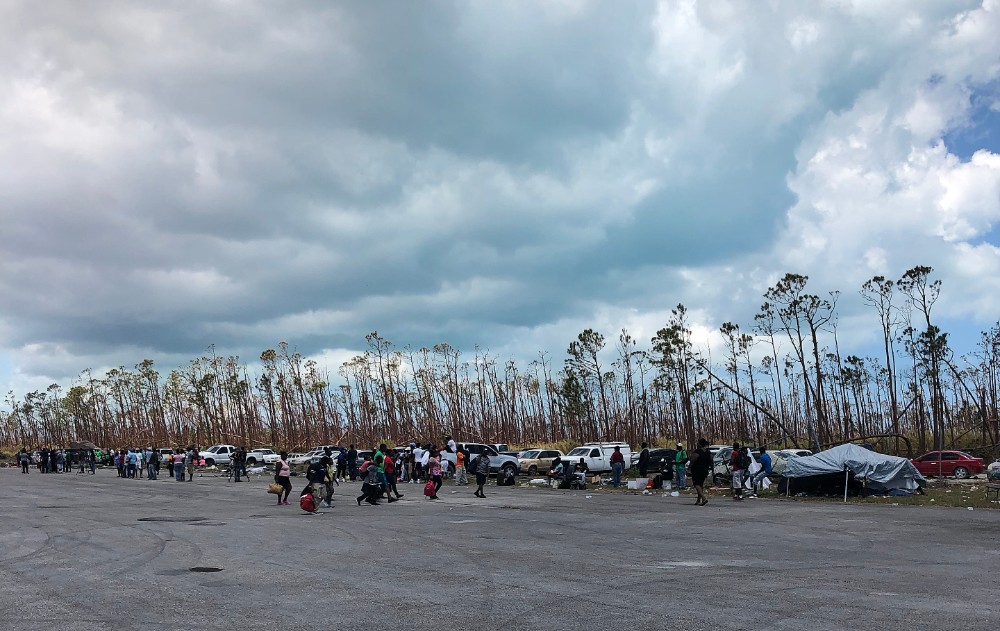
By Andy Brack, editor and publisher | A crowd of hungry people with hollow looks on their faces gravitate toward Bill Herbkersman’s plane every time it lands on devastated Treasure Cay in the Bahamas. But guards, seemingly new to the rifles they carry, stop the horde from moving forward.
 In the air is the stench of death. Herbkersman, a Bluffton developer and Republican state representative, can’t get it out of his nose.
In the air is the stench of death. Herbkersman, a Bluffton developer and Republican state representative, can’t get it out of his nose.
“I smell it right now,” he said Thursday after ferrying more than 3 tons of supplies to the island this week. “I don’t know if it is in the mind or in the nose. It is more acute every time you go in.”
Normally, the islands offer beautiful air-to-sea views of deep blue water surrounding lush green islands. This week’s visits looked vastly different, Herbkersman said. The islands were black from all of the dead vegetation. As he circled to land on the island where 1,200 people lived in 2010, he spied bodies floating in the sea. There’s no telling how many people died, he said. It’s all completely heartbreaking.
“When you see something floating, it’s either a body or a log — and logs usually float in toward the island.”
So far, he’s made six volunteer relief trips over three days in his Cessna 182 single-engine plane, which he calls a “Suburban on wings.” Through next week, he plans five more days of twice-daily round trips, each leg of which takes 90 minutes. On each trip from a Florida staging airport, his plane is packed with 1,100 pounds of whatever he can get — water, food, disinfectants, cleaning supplies and medical supplies, such as stethoscopes, gloves and medicine.
“They need everything over there,” he said earlier this week. “The people who are doing triage over there said they can really use baby powder and those bottles with bubbles in them for kids so they can keep the kids’ minds off of what happened. … Even a book club can get a case of baby powder.”
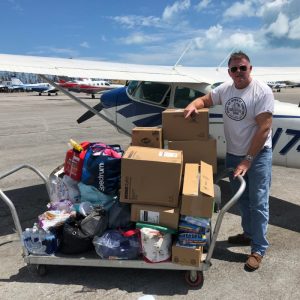
A veteran lawmaker first elected in 2002, Herbkersman generally is recognized as a cool-headed moderate. He sits on the powerful House Ways and Means Committee, which drafts the state’s annual $8 billion budget.
He said he’s learned as a volunteer ferry pilot how to be smarter in what he’s delivering. Instead of water, which is heavy, it’s better to take water purifiers. Another example: Solar-powered lights.
“I’m just humbled every time I go over there,” Herbkersman said later in the week. “Humbled and thankful I can do what I can do.”
Herbkersman’s journey started Sept. 7 when he loaded up some supplies in Bluffton and flew to Charleston, where he took on more relief material from MUSC and longtime friend and state Sen. Sandy Senn, a Charleston Republican who has some property and connections to the Abacos. Then he flew to Fort Pierce, Fla., before heading out early Sunday to ferry supplies.
Each round trip costs about $350 in fuel, which Herbkersman is covering.
“It makes you feel good,” he said of the volunteer effort. “We’re all in this together. Those folks have absolutely nothing.”
The generosity of Americans is on full display, Herbkersman said as he prepared to resume his volunteer effort.
“The American spirit is to help,” he said. “Everybody just seems to want to help. They just don’t know how to help.”
Herbkersman suggested for people to donate through reputable organizations with connections in the Bahamas. Some examples:
- He said the Knights of Columbus in Charleston, which filled a trailer full of supplies and took to Florida, is able to get things to those who need help through the Catholic church.
- Local Rotary clubs are coordinating cash donations with Rotary clubs on the islands.
- Water Mission, based in North Charleston, is sending water purification machines that can clean thousands of gallons of water daily. It’s matching donations dollar for dollar up to $1 million.
- Mediterranian Shipping Company in Charleston coordinated a trailer filled with supplies to take to one of its Florida ships to get aid to the Bahamas.
- Charitable donations of money also is fueling disaster relief. Other organizations raising money to help victims include the American Red Cross, Salvation Army and Americares.
Andy Brack’s latest book, “We Can Do Better, South Carolina,” is now available in paperback and for Kindle via Amazon.
- Have a comment? Send to: feedback@statehousereport.com.
SPOTLIGHT: Municipal Association of South Carolina
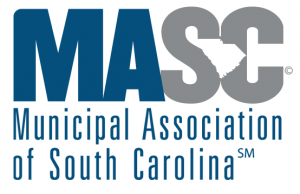 The public spiritedness of our underwriters allows us to bring Statehouse Report to you at no cost. This week’s spotlighted underwriter is the Municipal Association of South Carolina. Formed in 1939, the association represents and serves the state’s 271 incorporated municipalities.
The public spiritedness of our underwriters allows us to bring Statehouse Report to you at no cost. This week’s spotlighted underwriter is the Municipal Association of South Carolina. Formed in 1939, the association represents and serves the state’s 271 incorporated municipalities.
The Association is dedicated to the principle of its founding members: to offer the services, programs and products that will give municipal officials the knowledge, experience and tools for enabling the most efficient and effective operation of their municipalities in the complex world of municipal government.
- Learn more: MASC.
Legislature works against conservation, mitigation, reader says
To the editor:
Good article. Regarding policies that could save energy and reduce carbon emissions, you left one of the most obvious out: The legislature, in its infinite wisdom, is not neutral with respect to energy-saving technology. It is actively working against conservation and mitigation. Case in point: There is a $60 annual fee for hybrid cars. This is particularly poignant as Charleston and the Lowcountry struggle to recover from the fourth 100-year storm in five years.
Message to S.C. consumers: If you try to reduce your carbon footprint, and thus help save the Lowcountry, we will penalize you financially.
They could repeal the tax. But… naw…At least they don’t put hybrid drivers in jail, yet.
— Dana Beach, Charleston, S.C.
Climate is in crisis; Transform to clean energy
To the editor:
Many thanks for the article regarding clean energy and the urgency of the climate crisis. The 2018 IPCC report states that burning of fossil fuels must end by 2055 to keep the global temperature rise within 1.5 degrees Celsius.
The cost of a higher temperature rise will be incalculable. The technologies for clean energy generation, energy storage and great increases in energy use efficiency are available and scalable. What is needed are political will and financial incentives. Putting an increasing price on the carbon content of fossil fuels at the point of production will create an incentive for long-term investors (utilities, property managers, industries, public sector agencies) to invest in clean energy and greater efficiency. The [federal] Energy Innovation and Carbon Dividend Act (HR 763) is now in committee in the U.S. House and is the best carbon-pricing legislation. It will reduce U.S. carbon emissions by 40 percent in 12 years and grow the economy by returning all the carbon fee revenue to U.S. taxpayers as a dividend, with a net benefit to low-income families.
Price incentives depend on functioning energy markets. The [S.C.] Energy Freedom Act is an important first step, and its effectiveness will depend on how the state Public Service Commission implements it. Already, solar and wind with energy storage is competitive with new natural gas plants and this trend will continue. We ask our S.C. legislators to elect PSC members in 2020 who are committed to a clean energy transformation rather than to protecting legacy investments and over-investment in natural gas.
— Mark Gould, Citizens Climate Lobby, Charleston, S.C.
Send us your thoughts … or rants
We love hearing from our readers and encourage you to share your opinions. But you’ve got to provide us with contact information so we can verify your letters. Letters to the editor are published weekly. We reserve the right to edit for length and clarity. Comments are limited to 250 words or less. Please include your name and contact information.
-
- Send your letters or comments to: feedback@statehousereport.com
Old house with brown shutters
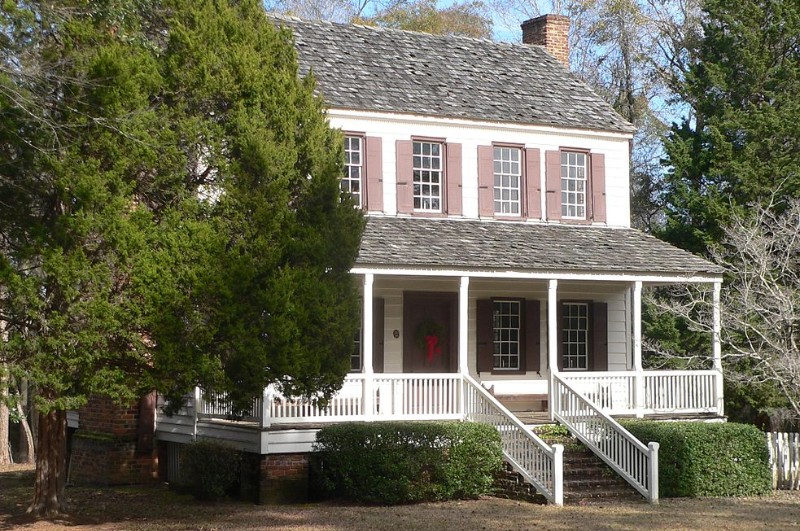
Here’s a two-story house with some history behind it, but where is it? Bonus: Tell us something cool about the house. Send your guess about the location of this photo to feedback@statehousereport.com. And don’t forget to include your name and the town in which you live.
Our previous Mystery Photo
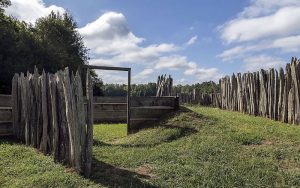 Our Sept.6 mystery, “Rustic, to say the least,” showed part of a reconstructed Revolutionary War stockade and fort at Ninety Six National Historic Site.
Our Sept.6 mystery, “Rustic, to say the least,” showed part of a reconstructed Revolutionary War stockade and fort at Ninety Six National Historic Site.
Congratulations to our intrepid photo sleuths who correctly identified the photo: Frank Bouknight of Summerville; George Graf of Palmyra, Va.; Charles Davis of Aiken; Jay Altman of Columbia; and James Pfeiffer of Greenwood.
Graf provided this context, according to ninetysixsc.gov: “In November 1775, in the early days of the Revolutionary War, the first land battle of the South was fought between Americans for and against British rule. During this battle, Patriot soldier James Birmingham was wounded by a musket ball and became the first South Carolinian to lose his life for freedom.
“Today, Ninety Six National Historic Site is located two miles south of the modern town of the same name. It features a visitor center, video on the site’s history, exhibits, and period artifacts. A one-mile interpretive walking trail leads past reconstructed trenches, the original Star Fort, the old village site, reconstructed Stockade Fort, and traces of original roads and paths.
“The park sponsors several popular living history programs throughout the year. In April (alternating years) Revolutionary War Days and Lifeways of the Cherokees and Settlers occur. These weekend events feature activities such as musket and cannon firing, colonial-era music and games, and ranger-led tours. On a Saturday evening in October the Autumn Candlelight Tour draws hundreds of visitors. In November the Backcountry Holiday program features ways that settlers celebrated the Christmas season. From May through August Living History Saturdays show visitors how colonial settlers and soldiers lived.”
- Send us a mystery: If you have a photo that you believe will stump readers, send it along (but make sure to tell us what it is because it may stump us too!) Send to: feedback@statehousereport.com and mark it as a photo submission. Thanks.
S.C. ENCYCLOPEDIA
HISTORY: The Battle of Ninety Six
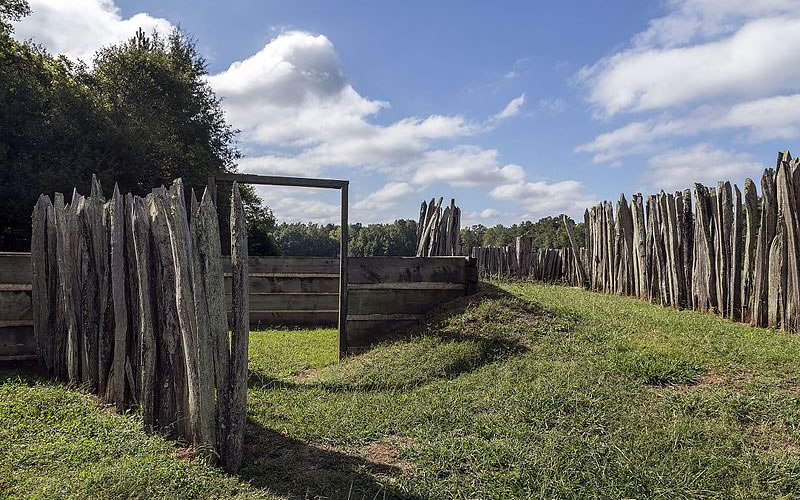
S.C. Encyclopedia | Situated in the South Carolina backcountry at the crossroads of important trade routes, Ninety Six was a newly-established courthouse town on the eve of the Revolutionary War. The question of independence deeply divided the inhabitants of the district. For many colonists, land grants and protection from Indian incursions created strong devotion toward Great Britain. Others thought that the crown had shirked promises of better government to backcountry settlers and favored independence. With mounting tensions and the absence of British authority, conflict began in the South Carolina backcountry as a civil war.
- EXTRA: The name “Ninety Six” is cloaked in mystery. Read more.
On July 12, 1775, patriot forces seized nearby Fort Charlotte on the Savannah River. Returning to Ninety Six with captured ammunition, the triumphant party was met by a group of Loyalists who had been informed by a defector from the patriot ranks. The affair ended without bloodshed, and the gunpowder was returned to the fort. Fighting was narrowly averted again a few weeks later when Tory forces gathered and threatened. Whig political leader William Henry Drayton and Major Andrew Williamson countered with a show of force, and the standoff ended with both sides agreeing to a truce on September 16. Weeks later a force of eighteen hundred Loyalists attacked one-third that number of patriots under Williamson, who gathered Whig forces in a hastily erected stockade near Ninety Six on November 18, 1775. The two groups had been jockeying for control of a supply of gunpowder and lead sent to the Cherokees by the colonial government. After three days of fighting with few casualties, the two sides agreed to a brief truce. Although neither side admitted defeat, Loyalist forces failed to recover the ammunition and withdrew. A month later, a substantial patriot force mounted an expedition, the so-called “Snow Campaign,” to crush organized Loyalist opposition.
The following year saw an increase in attacks on settlements in Ninety Six District by hostile Cherokees. In late July 1776 Williamson, now a brigadier general, mounted a punitive expedition into the Cherokee Nation, which ended in October. The village of Ninety Six experienced a period of relative peace for the next few years. Although Loyalists remained in the region, the courthouse village retained Whig rule. Crown forces, however, shifted their strategic focus from the northern to the southern colonies with the capture of Savannah in December 1778. Charleston fell in May 1780. Lieutenant Colonel Nisbet Balfour was quickly dispatched up the Cherokee Path to deal with any patriot militia still under arms in the upcountry. Arriving at Ninety Six in late June, he found that rebel leaders had surrendered the fort and munitions to royal authority a few days earlier. By the end of the year, the British had strengthened the old fort’s defenses and established Ninety Six as a depot and meeting ground for Tories.
Losses at King’s Mountain, Cowpens, and other engagements set the British on less than sure footing in South Carolina by February 1781. After the Battle of Guilford Court House in North Carolina in mid-March, the British commander in the South, Lord Cornwallis, retired to the North Carolina coast with his battered army. Instead of pursuing, the American commander, Major General Nathanael Greene, set out to reduce the chain of posts in occupied South Carolina. Royal forces soon surrendered or abandoned many positions in the northern and central parts of the state, and Greene turned his attention to the western garrison at Ninety Six. American forces arrived in late May. With his chief engineer, Colonel Thad- deus Kosciuszko, Greene surveyed the fortifications and decided to lay siege to the Star Fort, then under the command of New York Loyalist Colonel John Harris Cruger.
For 28 days, the small American army steadily dug siege lines and defended them against frequent sallies by the fort’s defenders. Other means were tried as well. But on June 17 word of a British relief column reached the besieged village. Greene reluctantly ordered an assault the next day, and for nearly an hour his soldiers bravely tried to breach the fort’s defenses without success. When Cruger’s men counterattacked successfully, the American commander ordered a retreat. The American army withdrew from Ninety Six two days before British reinforcements arrived. Afterward British commanders deemed the post untenable and abandoned their position within the week. The departing British Army demolished the fortifications and set fire to the few buildings still standing. The civil war would linger in the region for many months, but the withdrawal marked the end of a British presence at Ninety Six.
— Excerpted from an entry by Samuel K.Fore. This entry may not have been updated since 2006. To read more about this or 2,000 other entries about South Carolina, check out The South Carolina Encyclopedia, published in 2006 by USC Press. (Information used by permission.)
ABOUT STATEHOUSE REPORT
Statehouse Report, founded in 2001 as a weekly legislative forecast that informs readers about what is going to happen in South Carolina politics and policy, is provided to you at no charge every Friday.
Meet our team
- Editor and publisher: Andy Brack, 843.670.3996
- Statehouse correspondent: Lindsay Street
Buy the book
Now you can get a copy of editor and publisher Andy Brack’s We Can Do Better, South Carolina! ($14.99) as a paperback or as a Kindle book ($7.99). . The book of essays offers incisive commentaries by editor and publisher Andy Brack on the American South, the common good, vexing problems for the Palmetto State and interesting South Carolina leaders.
More
- Mailing address: Send inquiries by mail to: P.O. Box 22261, Charleston, SC 29407
- Subscriptions are free: Click to subscribe.
- We hope you’ll keep receiving the great news and information from Statehouse Report, but if you need to unsubscribe, go to the bottom of the weekly email issue and follow the instructions.
- © 2019, Statehouse Report. All rights reserved.


